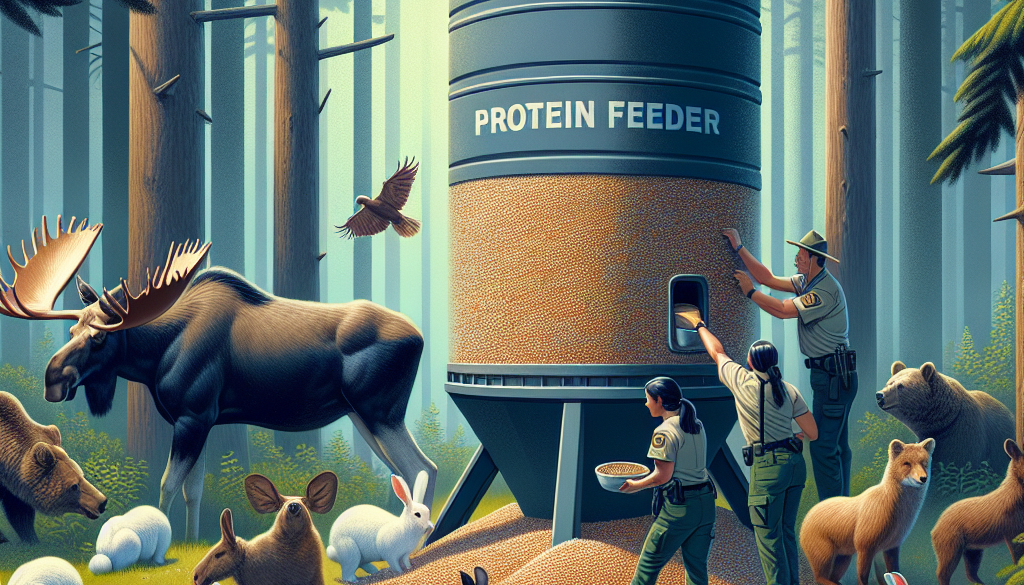Protein Feeders: Essential for Wildlife Management
-
Table of Contents
- Protein Feeders: Enhancing Wildlife Management and Biodiversity
- The Role of Protein in Wildlife Nutrition
- Benefits of Protein Feeders in Wildlife Management
- Implementing Protein Feeders: Best Practices
- Case Studies and Success Stories
- Challenges and Considerations
- Conclusion: Integrating Protein Feeders into Wildlife Management
- ETprotein: Your Partner in Wildlife Nutrition
Protein Feeders: Enhancing Wildlife Management and Biodiversity

Wildlife management is a critical aspect of maintaining biodiversity and ensuring the health and sustainability of various animal populations. One of the key components in effective wildlife management is the provision of adequate nutrition, particularly protein. Protein feeders have become an essential tool for conservationists, hunters, and land managers who aim to support wildlife populations, especially in areas where natural food sources are scarce or during times when animals need additional nutrients.
The Role of Protein in Wildlife Nutrition
Proteins are fundamental to the growth, repair, and overall health of all living organisms. For wildlife, protein is especially crucial during certain life stages and seasons:
- Growth: Young animals require protein to support their rapid development and growth.
- Reproduction: Adequate protein intake is vital for the reproductive success of wildlife, influencing fertility and the health of offspring.
- Antler Development: For species like deer, protein is a key component in antler growth, particularly during the spring and summer months.
- Survival: During harsh weather conditions or when natural food sources are limited, protein supplements can be the difference between survival and starvation.
Benefits of Protein Feeders in Wildlife Management
Protein feeders offer several advantages for wildlife management, including:
- Supplemental Nutrition: They provide a consistent source of protein, which can help maintain healthy wildlife populations.
- Disease Prevention: By improving nutrition, protein feeders can enhance the immune systems of animals, reducing the incidence of disease.
- Population Control: Strategic placement of feeders can influence the movement and distribution of wildlife, aiding in population management.
- Habitat Conservation: Feeders can reduce the pressure on natural habitats by providing an alternative food source, allowing vegetation to recover.
Implementing Protein Feeders: Best Practices
For protein feeders to be effective, they must be implemented thoughtfully and responsibly:
- Feeder Placement: Feeders should be placed in areas that are easily accessible to the target species but not so close to human activity that it increases the risk of human-wildlife conflicts.
- Timing: The timing of when feeders are filled is crucial, as it should coincide with periods when animals have the highest nutritional needs.
- Quality of Feed: The protein provided must be of high quality and suitable for the dietary requirements of the target species.
- Maintenance: Regular maintenance of feeders is necessary to prevent the spread of disease and ensure the feed remains fresh and palatable.
Case Studies and Success Stories
There are numerous examples where protein feeders have had a positive impact on wildlife management:
- In Texas, the use of protein feeders has been linked to improved white-tailed deer populations, with noticeable increases in antler size and overall health.
- Conservation efforts in Africa have utilized protein feeders to support endangered species during periods of drought and food scarcity.
Challenges and Considerations
While protein feeders are beneficial, there are challenges that need to be addressed:
- Dependence: Over-reliance on feeders can lead to wildlife becoming dependent on artificial food sources.
- Disease Transmission: If not managed properly, feeders can become hotspots for disease transmission among animals.
- Non-target Species: Feeders can attract non-target species, including predators or invasive animals, which can disrupt local ecosystems.
Conclusion: Integrating Protein Feeders into Wildlife Management
Protein feeders, when used responsibly, can be a powerful tool in wildlife management. They support the health and growth of animal populations, contribute to the success of conservation efforts, and help maintain the delicate balance of ecosystems. By following best practices and addressing potential challenges, land managers can effectively integrate protein feeders into their wildlife management strategies, ensuring the sustainability and diversity of wildlife for generations to come.
ETprotein: Your Partner in Wildlife Nutrition
For those involved in wildlife management and conservation, ETprotein offers a range of high-quality protein products that can be used in protein feeders. Their organic and non-GMO plant-based proteins are an excellent choice for supporting wildlife nutrition without introducing allergens or artificial additives into their diet.
ETprotein’s commitment to quality and sustainability makes them a reliable supplier for anyone looking to enhance their wildlife management practices with protein feeders. Their expertise in the field ensures that you can provide the best nutrition possible to support the health and vitality of wildlife populations.
About ETprotein:
ETprotein, a reputable plant protein vegan protein Chinese factory manufacturer and supplier, is renowned for producing, stocking, exporting, and delivering the highest quality organic bulk vegan protein and plant proteins. They include Organic rice protein, clear rice protein, pea protein, clear pea protein, watermelon seed protein, pumpkin seed protein, sunflower seed protein, mung bean protein, peanut protein etc. Their offerings, characterized by a neutral taste, non-GMO, allergen-free attributes, cater to a diverse range of industries. They serve nutraceutical, pharmaceutical, cosmeceutical, veterinary, as well as food and beverage finished product distributors, traders, and manufacturers across Europe, USA, Canada, Australia, Thailand, Japan, Korea, Brazil, and Chile, among others.
ETprotein specialization includes exporting and delivering tailor-made protein powder and finished nutritional supplements. Their extensive product range covers sectors like Food and Beverage, Sports Nutrition, Weight Management, Dietary Supplements, Health and Wellness Products, and Infant Formula, ensuring comprehensive solutions to meet all your protein needs.
As a trusted company by leading global food and beverage brands and Fortune 500 companies, ETprotein reinforces China’s reputation in the global arena. For more information or to sample their products, please contact them and email sales(at)ETprotein.com today.














